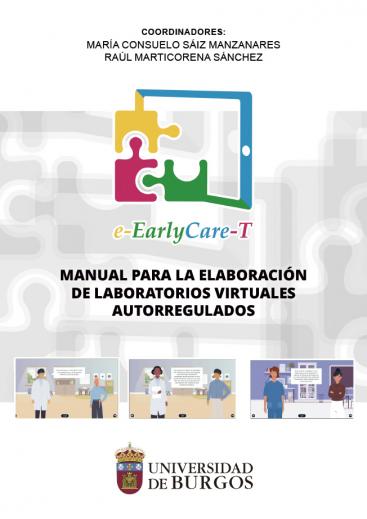Manual para la elaboración de laboratorios virtuales autorregulados
Palabras clave:
atención temprana, laboratorios virtuales, aprendizaje autorregulado, aistentes personales inteligentes, eye trackingSinopsis
Esta obra incluye materiales dirigidos a la formación de egresados y a la actualización de profesionales en ejercicio en el marco de la intervención temprana. También, integra a nuevos profesionales de la ingeniería biomédica. Dicha obra, contiene información sobre el diseño e implementación de laboratorios virtuales autorregulados aplicados a la resolución de casos prácticos en intervención temprana. En ellos, se incluye el uso de: chatbots, tecnología eye tracking multicanal integrada y técnicas de minería de datos. Este trabajo se ha desarrollado en el marco del proyecto co-financiado por la Unión Europea eEarlyCare-T nº 2021-1-ES01-KA220-SCH-000032661. Todos los materiales se han testado por profesionales de las instituciones participantes y especialistas externos.
DOI: https://doi.org/10.36443/9788418465871 (versión en español)
DOI: https://doi.org/10.36443/9788418465888 (versión en inglés)
Descargas
Resumen 416
Citas
Alcantud-Marín, F., y Alonso-Esteban, Y. (2021). Estudiantes universitarios con trastornos del espectro del autismo revisión de sus necesidades y notas para su atención. Siglo Cero, 52(2), 83-100. https://doi.org/10.14201/scero202152283100
Anguas-Gracia, A., Subiron-Valera, A.B., Anton-Solanas, I., Rodríguez-Roca, B., Satústegui-Dorda, P.J., y Urcola-Pardo, F. (2021). An evaluation of undergraduate student nurses’ gameful experience while playing an escape room game as part of a community health nursing course. Nurse Education Today, 103, 104948. https://doi.org/10.1016/j.nedt.2021.104948
Azevedo, R., Bouchet, F., Duffy, M., Harley, J., Taub, M., Trevors, G., Cloude, E., Dever, D., Wiedbusch, M., Wortha, F., y Cerezo, R. (2022). Lessons Learned and Future Directions of MetaTutor: Leveraging Multichannel Data to Scaffold Self-Regulated Learning With an Intelligent Tutoring System. Frontieres in Psychology, 13, 813632. https://doi.org/10.3389/fpsyg.2022.813632
Azevedo, R., y Gašević, D. (2019). Analyzing Multimodal Multichannel Data about Self-Regulated Learning with Advanced Learning Technologies: Issues and Challenges. Computers in Human Behavior, 19, 207-210. https://doi.org/10.1016/j.chb.2019.03.025
Brown, A., y DeLoache, J. (1978). Skills, plans and self-regulation. En R. Siegler (Eds.)., Children’s thinking: What develops? (pp. 3-35). Hillsdale, NJ: Erlbaum. https://doi.org/10.4324/9780203763087
Carrión-Toro, M., Santorum, M., Acosta-Vargas, P., Aguilar, J., y Pérez, M. (2020). iPlus a User-Centered Methodology for Serious Games Design. Applied Sciences, 10(24)9007. https://doi.org/10.3390/app10249007
Choi, J., Thompson, C.E., Choi, J., Waddill, C.B., y Choi, S. (2022). Effectiveness of immersive virtual reality in nursing education: systematic review. Nurse Educ., 47(3), E57-E61. https://doi.org/10.1097/NNE.0000000000001117
Churches, A. (2009). Taxonomía de Bloom para la era digital. https://eduteka.icesi.edu.co/pdfdir/TaxonomiaBloomDigital.pdf Recuperado de 10/08/2023
Diario Oficial de la Unión Europea. (2018). Recomendaciones del Consejo de 2 de mayo de 2018 relativa a las competencias clave para el aprendizaje permanente (2018/C 189/01).
Dignath, C., y Veenman, M.V.J. (2021). The Role of Direct Strategy Instruction and Indirect Activation of Self-Regulated Learning—Evidence from Classroom Observation Studies. Educ Psychol Rev, 33, 489–533. https://doi.org/10.1007/s10648-020-09534-0
Donnermann, M., Lein, M., Messingschlager, T., Riedmann, A., Schaper, P., Steinhaeusser, S., y Lugrin, B. (2021). Social robots and gamification for technology supported learning: An empirical study on engagement and motivation. Computers in Human Behavior, 121, 106792. https://doi.org/10.1016/j.chb.2021.106792
dos Reis Lívero, F.A., da Silva, G.R., Amaral, E.C. et al. (2021). Playfulness in the classroom: Gamification favor the learning of pharmacology. Educ Inf Technol, 26, 2125–2141. https://doi.org/10.1007/s10639-020-10350-w
Downer, T., Gray, M., y Capper, T. (2021). Online learning and teaching approaches used in midwifery programs: A scoping review. Nurse Education Today, 103, 104980. https://doi.org/10.1016/j.nedt.2021.104980
Felinska, E.A., Fuchs, T.E., Kogkas, A. et al. (2023). Telestration with augmented reality improves surgical performance through gaze guidance. Surgical Endoscopy, 37, 3557–3566. https://doi.org/10.1007/s00464-022-09859-7
García-Cabot, A., García-López, E., Caro-Alvaro, S., Gutierrez-Martínez, J-M., y de Marcos, L. (2020). Measuring the effects on learning performance and engagement with a gamified social platform in an MSc program. Computer Applications in Engineering Education, 28(1). https://doi.org/10.1002/cae.22186
Gatt, G., y Attard, N.J. (2023). Multimodal teaching methods for students in dentistry: a replacement for traditional teaching or a valuable addition? A three-year prospective cohort study. BMC Medical Education, 23(401) https://doi.org/10.1186/s12909-023-04377-z
Jamshidifarsani, H., Tamayo-Serrano, P., Garbaya, S., y Lim, T. (2021). A three-step model for the gamification of training and automaticity acquisition. J Comput Assist Learn, 37: 994–1014. https://doi.org/10.1111/jcal.12539
Jiménez-Hernández, E.M., Okataba, H., Díaz-Barriga, F., y Piattini, M. (2020). Using web‐based gamified software to learn Boolean algebra simplification in a blended learning setting. Comput Appl Eng Educ, 28, 1591-1611. https://doi.org/10.1002/cae.22335
Katebi, M. S., Ahmadi, A. A., Jahani, H., Mohalli, F., Rahimi, M., y Jafari, F. (2020). The effect of portfolio training and clinical evaluation method on the clinical competence of nursing students. Journal of Nursing and Midwifery Sciences, 7(4), 233. https://doi.org/10.4103/JNMS.JNMS_2_20
Ke, F., Dai, Z., Pachman, M., y Yuan, X. (2021). Exploring multiuser virtual teaching simulation as an alternative learning environment for student instructors. Instructional Science, 49(6), 831–854. https://doi.org/10.1007/s11251-021-09555-4
Kim, J., y Castelli, D.M. (2021). Effects of Gamification on Behavioral Change in Education: A Meta-Analysis. Int J Environ Res Public Health, 18(7), 3550. https://doi.org/10.3390/ijerph18073550
Massey, A., Zhang, W., y Amar, A. (2021). A comparison of non-traditional online and traditional wet-lab experiences in human anatomy and physiology: An innovative approach for pre-licensure nursing education. Nurse Education Today, 107, 105149. https://doi.org/10.1016/j.nedt.2021.105149
Mayer, C.W., y Rausch, A. (2023). Analysing domain‑specific problem‑solving processes within authentic computer‑based learning and training environments by using eye‑tracking: a scoping review. Empirical Research in Vocational Education and Training, 15(2). https://doi.org/10.1186/s40461-023-00140-2
Meichenbaum, D., y Goodman, J. (1969). The developmental control of operant motor responding by verbal operats. Journal of experimental Child Psychology, 7, 553-565. https://doi.org/10.1016/0022-0965(69)90016-2
Miechenbaum, D. y Goodman, J. (1971). Training impulsive children to talk to themselves: A means of developning self-control. Journal of Abnormal Psychology, 77, 115-126. https://doi.org/10.1037/h0030773
Mosalanejad, L., y Abdollahifar, S. (2019). Put Aside the Traditional Classroom and Use Effective Technology: Puzzles-Entertaining Ideas for Educating Psychiatric Diseases. Pakistan Journal of Medical & Health Sciences. https://doi.org/10.21203/rs.3.rs-3150206/v1
Nurmi, J., Knittle, K., Ginchev, T., Khattak, F., Helf, C., Zwickl, P., Castellano-Tejedor, C., Lusilla-Palacios, P., Costa-Requena, J., Ravaja, N., y Haukkala, A. (2020). Engaging Users in the Behavior Change Process With Digitalized Motivational Interviewing and Gamification: Development and Feasibility Testing of the Precious App. JMIR Mhealth Uhealth, 8(1), e12884. https://doi.org/10.2196/12884
Özbay, Ö., y Çınar, S. (2021). Effectiveness of flipped classroom teaching models in nursing education: A systematic review. Nurse Education Today, 102, 104922. https://doi.org/10.1016/j.nedt.2021.104922
Riveros, L.F.R., Zamora, V.R.J., Sanabria, J.E.S., y Tristancho, V.H.B. (2022). Development of a Clinical Simulator for Taking Arterial Gas Samples Based on Mixed Reality," 2022 Congreso de Tecnología, Aprendizaje y Enseñanza de la Electrónica (XV Technologies Applied to Electronics Teaching Conference), 2022, 1-6. https://doi.org/10.1109/TAEE54169.2022.9840664
Sáiz-Manzanares, M.C., Alonso-Martínez, L., Calvo-Rodríguez, A., y Martin, C. (2022a). Project-Based Learning Guidelines for Health Sciences Students: An Analysis with Data Mining and Qualitative Techniques. Journal of Visualized Experiments, e63601. https://doi.org/10.3791/63601
Sáiz-Manzanares, M.C., Carrillo-Pérez, C., Escolar-Llamazares, M.C., Rodríguez-Arribas, S., y Serrano Gómez, D. (2022b). Nursing Students’ Perceived Satisfaction with Flipped Learning Experiences: A Mixed-Methods Study. Sustainability, 14, 23, 16074 https://doi.org/10.3390/su142316074
Sáiz-Manzanares, M. C., Marticorena-Sánchez, R., Díez-Pastor, J. F., y García-Osorio, C. I. (2019). Does the use of learning management systems with hypermedia mean improved student learning outcomes? Frontiers in Psychology, 10, 1-14. https://doi.org/10.3389/fpsyg.2019.00088
Sáiz-Manzanares, M.C., Marticorena-Sánchez, R., Rodríguez-Díez, J.J., Rodríguez-Arribas, S., y Díez-Pastor, J.F. (2021c). Improve teaching with modalities and collaborative groups in an LMS: an analysis of monitoring using visualisation techniques. Journal of Computing in Higher Education, 33, 747-778. https://doi.org/10.1007/s12528-021-09289-9
Sáiz-Manzanares, M.C., Marticorena-Sánchez, R., Martín-Antón, L.J., Almeida, L., y Carbonero-Martín, I. (2023a). Application and challenges of eye tracking technology in Higher Education. Comunicar, 76, 1-12. https://doi.org/10.3916/C76-2023-03
Sáiz-Manzanares, M.C., Marticorena-Sánchez, R., Martín-Antón, L.J., González-Diez, I., y Carbonero-Martín, I. (2023b). Using eye tracking technology to analyse cognitive load in multichannel activities in university students. International Journal of Human–Computer Interaction. https://doi.org/10.1080/10447318.2023.2188532
Sáiz-Manzanares, M.C., Martin, C.F., Alonso-Martínez, L., y Almeida, L. (2021b). Usefulness of Digital Game-Based Learning in Nursing and Occupational Therapy Degrees: A Comparative Study at the University of Burgos. Int. J. Environ. Res. Public Health, 18, 11757. https://doi.org/10.3390/ijerph182211757
Silva, R., Rodrigues, R., y Leal, C. (2021). Games based learning in accounting education – which dimensions are the most relevant? Accounting Education, 30(2), 159-187. https://doi.org/10.1080/09639284.2021.1891107
Soboleva, E. V., Sabirova, E. G., Babieva, N. S., Sergeeva, M. G., y Torkunova, J. V. (2021). Formation of Computational Thinking Skills Using Computer Games in Teaching Mathematics. Eurasia Journal of Mathematics, Science and Technology Education, 17(10), em2012. https://doi.org/10.29333/ejmste/11177
Tang, M., Zhou, H., Yan, Q., Li, R., y Lu, H. (2022). Virtual medical learning: a comprehensive study on the role of new technologies. Kybernetes, 51(4), 1532-1554. https://doi.org/10.1108/K-10-2020-0671
Taub, M., y Azevedo, R. (2019). How Does Prior Knowledge Influence Eye Fixations and Sequences of Cognitive and Metacognitive SRL Processes during Learning with an Intelligent Tutoring System?. Int J Artif Intell Educ, 29, 1–28. https://doi.org/10.1007/s40593-018-0165-4
Taub, M., Azevedo, R., Bradbury, A.E., Millar, G.C., y Lester, J. (2018). Using sequence mining to reveal the efficiency in scientific reasoning during STEM learning with a game-based learning environment. Learning and Instruction, 54, 93-103. https://doi.org/10.1016/j.learninstruc.2017.08.005
Taub, M., Azevedo, R., Rajendran, R., Cloude, E.B., Biswas, G., y Price, M.J. (2021). How are students’ emotions related to the accuracy of cognitive and metacognitive processes during learning with an intelligent tutoring system? Learning and Instruction, 72, 101200. https://doi.org/10.1016/j.learninstruc.2019.04.001
Taub, M., Mudrick, N.V., Azevedo, R., Millar, G.C., Rowe, J., y Lester, J. (2017). Using multi-channel data with multi-level modeling to assess in-game performance during gameplay with CRYSTAL ISLAND. Computers in Human Behavior, 76, 641e655. http://dx.doi.org/10.1016/j.chb.2017.01.038
Taub, M., Sawyer, R., Lester, J., y Azevedo, R. (2020). The Impact of Contextualized Emotions on Self-Regulated Learning and Scientific Reasoning during Learning with a Game-Based Learning Environment. International Journal of Artificial Intelligence in Education, 30(1), 97–120. https://doi.org/10.1007/s40593-019-00191-1
Van der Stel, M., y Veenman, M. (2008). Relation between Intellectual Ability and Metacognitive Skillfulness as Predictors of Learning Performance of Young Students Performing Tasks in Different Domains. Learning and Individual Differences, 18, 128-134.
http://dx.doi.org/10.1016/j.lindif.2007.08.003
Veenman, M. V. J. (2015). Teaching for Metacognition. En J. D. Wright (Ed.), International Encyclopedia of the Social & Behavioral Sciences (Second Edition) (pp.89-95). Oxford: Elsevier https://doi.org/10.1016/B978-0-08-097086-8.92136-6
Veenman, M. V. J. (2017). Assessing Metacognitive Deficiencies and Effectively Instructing Metacognitive Skills. Teachers College Record, 119(13), 1-20. https://doi.org/10.1177/016146811711901303
Veenman, M. V. J., y Alexander, P. (2011). Learning to self-monitor and self-regulate. In R. Mayer y P. Alexander (Eds.), Handbook of research on learning and instruction (pp. 197–218). New York: Routledge. https://doi.org/10.4324/9781315736419
Veenman, M. V. J., van Hoult-Wolters, B. H. A. M., y Afflerbach, P. (2006). Metacognition and learning: conceptual and methodological con-siderations. Metacognition Learning, 3-14. https://doi.org/10.1007/s11409-006-6893-0
Veer, V., Phelps, C., y Moro, C. (2022). Incorporating Mixed Reality for Knowledge Retention in Physiology, Anatomy, Pathology, and Pharmacology Interdisciplinary Education: A Randomized Controlled Trial. Med.Sci.Educ, 32, 1579-1586. https://doi.org/10.1007/s40670-022-01635-5
Waghale, V., Gawande, U., Mahajan, G., y Kane, S. (2022). Virtual Patient Simulation- an Effective Key Tool for Medical Students Enhancing Diagnostic Skills. ECS Transactions, 107(1). https://doi.org/10.1149/10701.16191ecst
Wiedbusch, M.D., Kite, V., Yang, X., Park, S., Chi, M., Taub, M., y Azevedo, R. (2021). A Theoretical and Evidence-Based Conceptual Design of MetaDash: An Intelligent Teacher Dashboard to Support Teachers' Decision Making and Students’ Self-Regulated Learning. Frontiers in Education, 6. https://doi.org/10.3389/feduc.2021.570229
Zimmerman, B. J., y Schunk, D. H. (2011). Self-regulated learning and performance: An introduction and an overview. In D. H. Schunk, B. Zimmerman (Eds.), Handbook of self-regulation of learning and performance (pp. 1–12). New York, US: Routledge/Taylor y Francis.
Zorrilla-Pantaleón, M.E., García-Saiz, D., de la Vega, A. (2021). Fostering study time outside class using gamification strategies: An experimental study at tertiary-level database courses. Comput Appl Eng Educ, 29, 1340–1357. https://doi.org/10.1002/cae.22389

Descargas
Publicado
Categorías
Licencia

Esta obra está bajo una licencia internacional Creative Commons Atribución-NoComercial-SinDerivadas 4.0.







